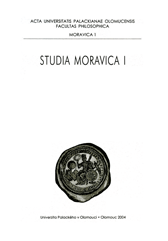JAN ČEP A TIMOTHEUS VODIČKA: DVĚ CESTY V ČESKÉM KATOLICKÉM MYŠLENÍ
JAN ČEP AND TIMOTHEUS VODIČKA: TWO LINES IN CZECH CATHOLIC THINKING
Author(s): Petr KomendaSubject(s): Literary Texts
Published by: Univerzita Palackého v Olomouci
Summary/Abstract: The present study compares the two abovementioned personalities from the point of view of literary criticism and makes an attempt to reveal the very causes of their different attitudes to literature. The use of neo-thomism in Czech literature noticeable in the work of Timotheus Vodička was an attack against literary modernism, avant-garde and the further development of individuals in 1930’s. The fact was most distinctly proved during the dispute arising with respect to the novel of Karel Schulz Kámen a bolest (Stone and Pain). On the other hand, Jan Čep inclined to the revived Catholic movement grounded on the ideas of Léon Bloy and Josef Florian. The conception of undogmatic, committed and declared Christianity allowed Čep to accept even as contrasting personalities as A. Camus and Vl. Vančura.
Journal: Studia Moravica. Acta Universitatis Palackianae Olomucensis Facultas Philosophica - Moravica
- Issue Year: 2004
- Issue No: 1
- Page Range: 213-219
- Page Count: 7
- Language: Czech

